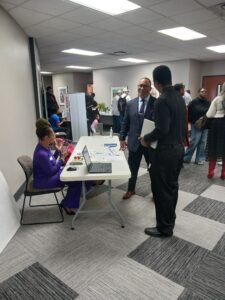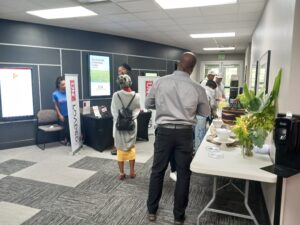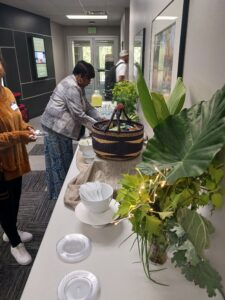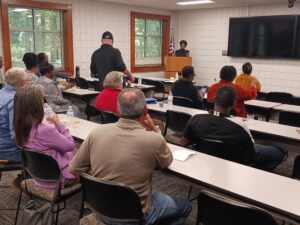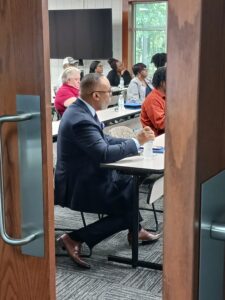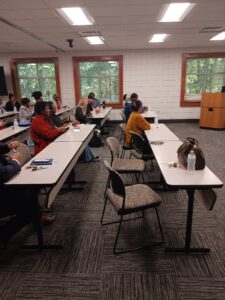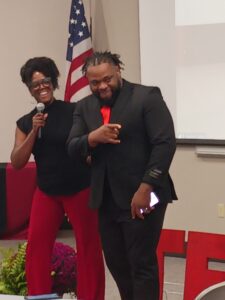Progress report for EDS23-055
Project Information
The Innovative Urban Ag Project is an educational campaign that harnesses technology and the latest growing practices in urban agriculture and beyond to deliver higher food production in smaller spaces with a net zero carbon foot print as a goal. In tandem with this two year project, there will be an educational, interactive mobile app that keeps growers updated and engaged through the process of achieving this goal. To elevate the experience of the project, an annual conference will be held to bring it all together as a mecca of all things ag advancement.
The Innovative Urban Ag Conference (IUAC) is a one day, power packed event that will encompass live, futuristic agriculture exhibits, educational workshops and one of a kind experiences that will expose agricultural producers and consumers to modern day practices and industry goals. Row croppers, small and underserved producers, low income community leaders and advocates, city and state officials, those focused on food security and young and beginning growers are targeted to attend and learn how they can be an active solution to localized food security in coordination with carbon sequestering agricultural practices. This conference will help establish, enhance, expand and build upon urban agriculture practices with modern technology and spur much needed partnerships. The prevalence and increase of food desserts and USDA low income/low access areas calls for an attainable change that can be delivered by vulnerable persons in vulnerable areas to heal and renew socioeconomic and food security issues.
Conference - Provide opportunity, funding information, partnerships, education, and information
Working plan- Four virtual workshops held at one per quarter/season, to collect data and input, collaborate and establish priorities
Mobile app launch- Launch educational app that will bridge connections and access growers in an innovative way to disseminate information
Needs assessment- end of year needs assessment virtual workshop to contour working plan around for quality planning
Cooperators
Education
A hybrid conference was held in conjunction with educational and agricultural partners. Attendees experienced interactive presentations from experts in the field of conservation, academia, climatology, and nutrition. A TED Talk was incorporated into the conference and included speakers that compelled change and innovation in agriculture models. USDA Officials and University professionals presented to attendees with discussion panels and a virtual workshop to coincide.
Educational & Outreach Activities
Participation Summary:
Urban new and underserved growers, low income youth and students, single mothers, BIPOC, underserved, veterans, unregistered farmers that need assistance and those wanting to begin farming will be appealed to through virtual and in person meetings, information dissemination of information in relevant groups and pages on social media, social media ads, radio morning show highlights, TV interview, and by access to our partner's membership network:
National Women in Agriculture - America's largest minority agriculture organization.
The GrowOp - an organization of small urban farmers in Arkansas that focus on community activism and food security
4H and TRIO programs at participating Universities in the state
Learning Outcomes
Innovative Growth Practices were learned. Producers gain knowledge about way to incorporate innovative growth practices such as vertical farming, hydroponics, and aquaponics and how these practices can maximize agricultural productivity while minimizing environmental impact.
Producers gained knowledge about access to USDA Funding for Innovative Agriculture Projects. Guidance and understanding was provided about the various USDA funding programs available for innovative agriculture projects, such as the Specialty Crop Block Grant Program, Conservation Innovation Grants, Urban Agriculture and Innovative Production grants, and Value-Added Producer Grants.
Participants built relationships with USDA representatives and received guidance from agricultural extension officers.Participants learned best communication practices for community agriculture models. Strategies were provided on how to best employ clear and accessible language when communicating with diverse audiences about community agriculture models, emphasizing the benefits of local food production, sustainability, and food security.
Participants learned how to integrate new skills into existing models of urban agriculture. By providing training and capacity-building opportunities for urban agriculture practitioners to learn and adopt new skills, technologies, and sustainable practices, this conference offered workshops, apprenticeship opportunities, and mentorship programs opportunities to facilitate the integration of innovative techniques into existing urban agriculture models.
Opportunity to work with diverse populations in Low-Income Urban Settings was provided. We recognized and encouraged respect of the cultural diversity and unique needs of low-income urban populations when designing and implementing agricultural models.
Project Outcomes
Three University partnerships were created with the partnering organization The Sustainability Project for black farmers that want to initiate innovative, climate smart growing practices.
Ten farmers collaborated for an aquaponics cohort that teaches the essentials of water conservation through aquaponics in urban settings.
Thirteen farmers created a consortium of networks across the state to plan and coordinate efforts for attendance an presentation about Black Urban Ag Models at the 2024 Innovative Ag Conference.
There were several black urban growers in attendance at the conference an on virtual meetings that expressed the barriers that they face with Urban Ag and initiating innovative models in their community. Due to these barriers, their communities suffer more from the food desert effect and may have higher rates of crime, blight, homelessness and other socio-economic issues. These producers being able to grow effectively where they are will allow them to be industrious , generate income, and feed their families and communities more efficiently.
Barriers reported were:
- Over regulation in city setting that limited the distance requirement in feet measured for chickens to be raised
- Limitations and blockages on hoop house acquisition in the city of Pine Bluff
- Rain catchment limitations
- Code ordinances that forbid certain USDA programs such as hoop houses
- Lack of access to funding from city and state offices directly to farmers like other states have
